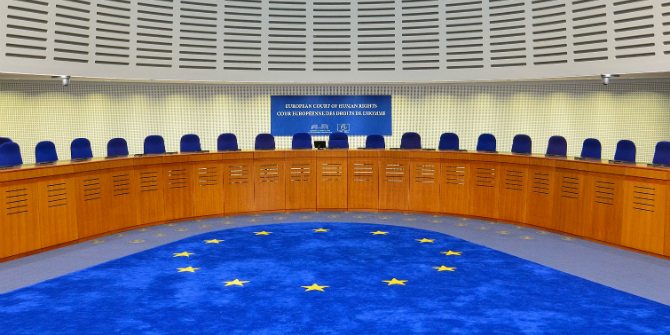 The High Court has ruled that Parliament must be consulted before Article 50 is triggered and Britain begins the process of leaving the EU. Jo Murkens says the judgment was exemplary in its clarity and reasoning, and amounts to a major setback for Theresa May’s plans.
The High Court has ruled that Parliament must be consulted before Article 50 is triggered and Britain begins the process of leaving the EU. Jo Murkens says the judgment was exemplary in its clarity and reasoning, and amounts to a major setback for Theresa May’s plans.
Did judges today declare war on democracy? Did the High Court overstep its mark into political territory? No. The judicial decision in R(Miller) has clearly thrown a spanner in the works of the government’s Brexit strategy. But its focus is strictly constitutional, not political. The court expressed no opinion on whether Article 50 TEU should be triggered. The only question it examined was whether, as a matter of UK constitutional law, the Crown, acting through the government, is entitled to use prerogative powers to trigger Article 50 in order to cease to be a member of the European Union [see paragraph 4 of the judgment].
The irrevocability of Art.50
Before the court could tackle UK constitutional law it needed to address a background question, namely whether notification of the European Council under Article 50 could subsequently be reversed. The answer to that question is actually unclear. Lord Kerr, for instance, thinks it is reversible. Moreover, since the question involves a question of EU Treaty law, the final answer could only be given by the Court of Justice of the EU.

The present case did not have to answer that question as both parties assumed that a notice under Art.50(2) cannot be withdrawn and cannot be qualified. The effect of the notice cannot, for example, be made subject to future parliamentary approval of the UK-EU negotiations. It follows, and both parties agreed, that triggering Article 50 ‘will inevitably result in the complete withdrawal’ of the UK from the EU [10; 11].
Constitutional requirements
Article 50(1) TEU allows the UK to withdraw from the EU ‘in accordance with its own constitutional requirements’. But what does the UK constitution require? Turning to that question, the court addressed the relationship between the Crown’s prerogative powers, i.e. the residue of monarchical authority that is now exercised by ministers, and the doctrine of parliamentary sovereignty. On the one hand, it is an established feature of the UK constitution since 1688 that an Act of Parliament cannot be supplanted by the exercise of a prerogative power [25; 26]. On the other hand, it is equally established that the prerogative powers of the Crown cover international relations and the conclusion of treaties [30].
On the basis of the second point, the government argued that the Crown has a prerogative power to authorise the UK’s withdrawal from the EU, and that this power can only be taken away by express terms in an Act of Parliament. In the absence of express statutory words, the prerogative powers of the Crown over Art.50 remain intact [31]. The court acknowledges the government’s position as correct, but only with respect to rights and obligations created as a matter of international law. As soon as individual rights protected by domestic law are affected, Parliament must be involved [32; 34].
Individual rights
The court then turned its attention to individual rights protected in domestic law, and the extent to which they would be affected by EU withdrawal.
The parties distinguished between three different categories of rights. The first category embraced rights that were capable of replication in domestic law. The Working Time Directive was given as an example: there is nothing in principle to stop Parliament from enacting its provisions into domestic law. The second category refers to rights enjoyed by UK nationals in other Member States. The third category deals with those rights that cannot be replicated in UK law and would be lost upon withdrawal. The right to be selected and to be elected to the European Parliament, and to vote in those elections, would be good examples [57-61].
In relation to categories (i) and (ii), the government claimed that the loss of rights would not be as great as put forward by the claimants. In the court’s view, the government’s submissions on those categories were formally correct, but ‘divorced from reality’ [66]. But it was in relation to category (iii) that the government conceded that those rights would irretrievably be lost upon withdrawal. It is at this point in the decision [63] that the case was lost. The claimants needed to establish a loss of individual rights in the UK, and the government agreed that category (iii) rights would be lost.
Conclusion: a proper drubbing for the government
The decision amounts to a proper drubbing for the government. First, it was not the claimants that landed the hammer blow on the government. The government dealt that blow to itself by agreeing that the Art.50 notification would inevitably lead to the loss of some individual rights. Second, it is entirely proper for the court to be looking for express language in an Act of Parliament before it agrees to override a fundamental constitutional principle, such as the subordination of the Crown to law. This is, after all, what the government was asking the court to do. However, it was the Secretary of State who wanted to reverse the burden by demanding that the claimants find express statutory language that removes the Crown’s powers in the context of international relations. On the central issue, settled since 1688, that the Crown cannot use prerogative powers to remove an Act of Parliament, the Secretary of State was silent. [84]. In the court’s opinion, the central plank of the government’s submission was ‘flawed at this basic level’ [84].
The High Court’s decision is exemplary in its clarity and reasoning. Anyone interested in a tutorial on the UK constitution should read the first 56 paragraphs. The legal challenge was not supposed to be a major obstacle for the government. All it needed to assert and defend were the UK’s own constitutional requirements. In failing to understand the constitution of its own country, the government was taught an embarrassing lesson by the High Court on the Strand. The next stop is the UK Supreme Court.
This post represents the views of the author and not those of the Brexit blog, nor the LSE.
Jo Murkens is Associate Professor in the Department of Law at the LSE.
More by Jo Murkens:
The Great ‘Repeal’ Act will leave Parliament sidelined and disempowered







I see decision re cat (i) rights as unproblematic (in the absence of a Great Repeal Act), decision re cat (ii) rights as odd (rights granted by other EU Member States which are unenforceable in the UK!), and decision re cat (iii) rights as arguable at best (in form if not substance these rights would survive, but in any case the relevant legislation is a mere mechanism for implementing supranational rights. It is not inconceivable that the CJEU would even treat the adoption of such legislation as an act performed by the UK Parliament in its capacity as an organ of the EU.
Any thoughts on the Northern Ireland case (R v McCord)? The Belfast court considered the matter to be not justiciable? Will that be reversed on appeal?
This is a curious judgment. How odd can be seen by imagining a different scenario. Suppose David Cameron had sent a note triggering Art.50 (as he promised) on 24 June as soon as the result was clear. Just what judgment or declaration could the Div Court have rendered if Ms Miller had sued then? It couldn’t prevent a fait accompli. And if it declared that the service was ineffective, wouldn’t it be met with a polite response from Brussels that that’s a matter of EU law and nothing to do with the English court?
I also find the statutory rights argument puzzling. OK: the Case of Proclamations etc makes it clear that the crown can’t take away anyone’s rights by mere fiat. But all that seems to follow from that is that statutory rights arising directly or indirectly from the ECA might not be effectively taken away by an Art.50 declaration. It doesn’t say anything at all about whether Mrs May can make the declaration, leaving its possible effects in English law to another day.
The EU treaties state the the Art.50 must be triggered in accordance with each states constitution. The Supreme court is the ultimate arbiter as to the constitution of the UK, therefore the ECJ would defer to the SC ruling. If David Cameron triggered it immediately after the vote and this ruling was upheld by the SC, the Art.50 process would have to stop and to be restarted from the beginning after an act of parliament.
But what if the treaties are illegal under English Law and also under the Vienna convention.
http://tinyurl.com/jzcrztc
I ask again, why are we in court defending our vote to those who wish to commit treason against us, as Heath did. He hid this under the 30 year rule because he thought once we had been subsumed we could not extricate ourselves…but if true – we can.
I am no constitutional lawyer, so I leave the detailed arguments to constitutional lawyers.
I am however a committed European, who has enthusiastically supported British EU membership since the UK joined the EU (at that time the EEC) in 1973.
I have seen a whole stream of primary and secondary EU legislation incorporated into UK law over the past 40 years.
It makes sense that, for the UK to leave the EU, a vast amount of legislation has to be amended at the UK level, and the EU level as well. The only people properly qualified to do this are MPs and Lords at the Westminster level, and MEPs at the Brussels level. This is not “over-ruling the people’s will”; it is a plain statement of fact in any Western democracy with a sovereign legislature.
What part of the word ‘democracy’ don’t you folks understand? All of it apparently.
I am puzzled by the 3 categories. Surely all rights must be (paras 58-61) either Category i) – ‘rights capable of replication in the law of the United Kingdom – or Category iii) ‘rights that could not be replicated in UK law’. Category ii) seems to fall entirely within Category iii) since I don’t see how we can legislate to preserve rights enjoyed in other member states. So, on the face of it, it might seem more natural to deal with ii) as a sub-category of iii).
Andrew
Sorry, I see it now, categories i) and iii) are further defined in the text as rights having an effect in the domestic law of the UK or similar, while category ii) concerns rights enjoyed in other Member States. Andrew
Let us be under no illusion. This has very little to do with allowing parliament a vote on Brexit. It has a great deal to do with keeping Britain in the EU. The Remainers have been bleating ever since the referendum result. They hate demcracy, unless of course it gives them the result that THEY want. They are utterly determined that Brexit will NOT go ahead despite the fact that 52% of those who bothered to turn out and vote wanted it.We on the Leave side are absolutely determined that it WILL go ahead. They will NEVER stop it. This is a TEMPORARY victory only for them. The will of the MAJORITY matters for more the that of the whining whinging minority.
Lady Hale, Deputy President of the Supreme Court, in giving the Sultan Azlan Shah Lecture 2016, Kuala Lumpur, on 9 November 2016, stated, in relation to the referral of R (Miller and others) v Secretary of State for Exiting the European Union [2-16] EWHC 2768 (Admin) to the Supreme Court, that: “The case raises difficult and delicate issues about the constitutional relationship between Government and Parliament. What is meant by the exercise of the executive power of the State? To what extent can it be exercised in a way which may undermine the exercise of the legislative power of the State?”
Perhaps, also in the light of Lord Neuberger’s, Bar Council Law Reform Lecture 2016, on Monday, 21st November, where he stated (at para 31), “…. However, the United Kingdom’s unusually ill-defined and informal constitutional arrangements permit a flexible and practical response to problems,” maybe, my intended comment would not be too adrift from likely advance thinking; which would not normally be made public.
I wonder, will the President, or one of the other Lordships, of the Supreme Court, open the proceedings at the Hearing, on 5th December 2016, with the following statement? I guess not, but why not?
Well, this is my statement:-
LORD XXX: (with whom all the other Lordships and her Ladyship agree)
To say the least, this is an extraordinary moment in the development of the Constitutional history of the United Kingdom. We have the advantage that we are not wholly bound by a Written Constitution, equally we have the problem that the long history of the United Kingdom places restrictions upon a complete freedom of thinking.
In addressing you all at the beginning of this Hearing, I am probably going to cause you some degree of disappointment because I am conscious of the fact that you have come to this court prepared to persuade us of the merits of your particular arguments.
What I am about to tell you is unlikely to be what you are expecting, but please wait until my concluding remarks before you start your own thinking.
We have already reached a decision on this matter and that decision is based upon our own understanding of the situation. In saying that, I am sure that all of you would recognize the fact that we have not been locked up in a secure location where we have been deprived of awareness of the progressive developments leading up to the referendum; and also to much of the exchanges that have been taking place between the various parties; and, moreover, the judgment of the High Court on 3rd November 2016.
In reaching our decision, we are very much aware that we, as the Justices in this matter, are all interested parties in this action because we are all citizens of the United Kingdom and we, ourselves, may have taken part in voting in the referendum. In addition, some Justices may hold properties in other member countries of the EU. Further, some of us may have even wondered, at various times, if we would be selected to become appointed to the European Court of Justice. Indeed, this situation puts an interesting gloss on any judgment about giving a notice under Article 50(2) of the TEU because there are no Justices available who can claim to be wholly independent of this unique matter before this court.
In accepting the fact that this situation means that no one is independent of this issue and everyone is, in one way or another, affected by the issue, it is clear that the arguments could go on, and on, forever.
In view of what I have stated already, I will now tell you that our unanimous decision is this: that because this is a democratic country and because Parliament decided to hold a referendum of the electorate, we have decided that the outcome of that referendum gives the Government executive power to serve a notice under Article 50(2) as soon as the Government believes that it is prudent to do so.
There is no situation that we can see whereby any of us who, as stated, cannot be wholly independent on the matter, can legitimately override the will of the majority. All arguments one way or the other, no matter how legitimate in points of principle, cannot be said to be more relevant to this issue than the will of the electorate.
In some respects, in a matter such as this, one may look at the reverse of a situation. For example, when the people of Scotland were given the opportunity to vote by referendum whether or not to remain part of the United Kingdom, a majority voted to stay. Clearly, that upset those who advocated the case for independence; and the arguments go on and on about how independence can be achieved. However, if the outcome had been the opposite and if there had been a simple majority in favour of independence, there would have been a massive outcry by the same people if a court, upon application, ruled that the question of independence had to be debated and voted upon in Parliament before any steps could be taken by the executive to give effect to the majority wish of the people of Scotland.
Likewise, if the vote in the recent referendum in the United Kingdom had by a majority decided to remain in the EU and the court, upon application, ruled that the outcome could not be taken as conclusive and a further referendum should be considered by Parliament before the matter was settled, then we expect that there would have been an equal outcry of disregarding the will of the people.
This whole issue is fraught with many arguments which can be used one way or another. However, like the normal elections for MPs in the United Kingdom, there is a time for the electorate to express its preference by a ballot of the registered voters. Whatever the outcome of that ballot, the next period of Parliament will be controlled by the elected Government; even if that elected Government were chosen by the narrowest of margins in the sense of a majority in favour or otherwise in each constituency.
At least, the referendum in respect of the EU, was a collective vote of the whole of the United Kingdom. The majority decision of the voters was that the United Kingdom should leave the EU. However, if upon leaving the EU, the people of the United Kingdom, perhaps some five or ten years up the road, or even earlier, rue the day that they voted to leave the EU, the Treaty of Europe already anticipates that possibility; and, in Article 50(5), it states that, “If a State which has withdrawn from the Union asks to rejoin, its request shall be subject to the procedure referred to in Article 49.” The Article 49 is, of course, the standard procedure for joining the EU by any European State which respects the values referred to in Article 2 and is committed to promoting them.
Inevitably, the reasoning and debating can go on and on and no doubt it will fuel the debating chambers across the academic world for many years to come. However, with the recognition of the reality of endless debate and the fact that this court is only deciding upon the issue of whether or not the Government can activate Article 50(2) without Parliamentary approval, I must now conclude my comments above and return to this Hearing with another statement about our decision on that matter.
Having declared our unanimous decision, I will now tell you that we have also decided to do another extraordinary thing which is, we believe, entirely compatible with the unique nature of this Hearing. We shall now give all parties to this action a final chance of telling us why we are wrong in our decision and if any party demonstrates that its own concept is more justified than our decision, then we shall consider that before releasing the Judgment. In reconsidering our present decision, each of the 11 Justices will be free to take their own view on the matter and, of course, there could be a simple positive majority either way, i.e., 5 believing one way and 6 believing the other way. In which case, the outcome would be based upon a simple majority. This factor is one of the important factors in our reaching the decision already explained to you, namely: that a majority judgment by this court should not override the majority judgement of the people. In short, based upon our knowledge of the matter and the fact, as explained above, that we cannot be wholly independent in our views, this has led us to reach the conclusion which we have done.
Now, in order to give everyone an opportunity to reflect upon what I have stated, we shall adjourn this Hearing and commence again in two days time. Upon recommencement, we shall listen carefully to your comments. And, as an advance observation, the more your comments are diverse and complex, the more we shall believe our decision, as already presented, to be correct.
Can someone explain something to me please.
1. Edward Heath’s deliberate treason (see letter to Lord Kilmuir FOI request) rendered the EU illegal and as no laws can come from a treasonous act it stands to reason that we have never legally been in the EU.
2. Magna Carta is for all time and it clearly states that we cannot be governed by a foreign power so why is this court case even happening?
Because of Heath’s treacherous behaviour doesn’t it mean that we have been governed by Unlawful Assemblies for decades so it stands to reason that these Remainers are committing treason too by following what Heath did.
His crime was never rectified or punished although he admitted it on TV…i saw him. All he could say when confronted was: “Oh well, it’s too late now”…the man had no shame and many believe he was being blackmailed because of his alleged perversions…which all makes sense now.